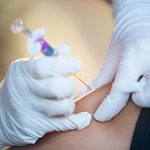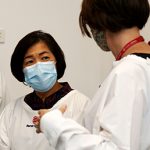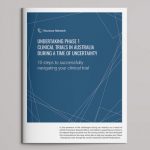This week an exciting new new laser technology was launched; we talked collaboration & cooperation with a visiting dignitary; identified factors for success in clinical trials; saw the real impact of research on the health of truck drivers, new & expecting mothers, and people experiencing homelessness; and learned more about women’s experiences in science and about COVID vaccines. Here’s just some of the highlights from this week at the Alfred Research Alliance…
BAKER HEART AND DIABETES INSTITUTE
Start-up launches new laser technology to prevent heart attacks
 A new Australian company called Nirtek is gearing up to develop and commercialise innovative technology that uses lasers to detect unstable coronary plaques, the leading cause of deadly heart attacks. Nirtek CEO Matthew Hoskin said the technology was a terrific example of medical research providing the solution to a clearly defined clinical problem, in this case helping to prevent Australia’s biggest killer. Read more…
A new Australian company called Nirtek is gearing up to develop and commercialise innovative technology that uses lasers to detect unstable coronary plaques, the leading cause of deadly heart attacks. Nirtek CEO Matthew Hoskin said the technology was a terrific example of medical research providing the solution to a clearly defined clinical problem, in this case helping to prevent Australia’s biggest killer. Read more…
BURNET INSTITUTE
Talking vaccines on ABC radio
 If you missed this recently, take a listen as one of Burnet’s leading vaccine experts and Program Director Disease Elimination, Prof Heidi Drummer, joined ABC Melbourne’s Drive presenter Raf Epstein to discuss the latest news about the COVID-19 vaccines, their efficacy and whether they can prevent transmission. Listen now…
If you missed this recently, take a listen as one of Burnet’s leading vaccine experts and Program Director Disease Elimination, Prof Heidi Drummer, joined ABC Melbourne’s Drive presenter Raf Epstein to discuss the latest news about the COVID-19 vaccines, their efficacy and whether they can prevent transmission. Listen now…
Single dose vaccine data encouraging says Prof Brendan Crabb
 New analysis of trials showing a single dose of the Oxford/AstraZeneca vaccine could offer sustained protection against COVID-19 are encouraging, but Burnet Director and CEO Professor Brendan Crabb AC believes it’s too early to recommend this approach for Australia. “Let’s see the situation play out,” he says. Read more…
New analysis of trials showing a single dose of the Oxford/AstraZeneca vaccine could offer sustained protection against COVID-19 are encouraging, but Burnet Director and CEO Professor Brendan Crabb AC believes it’s too early to recommend this approach for Australia. “Let’s see the situation play out,” he says. Read more…
Burnet hosts Thai Ambassador
 Burnet Institute recently hosted Her Excellency Ms Busadee Santipitaks, Ambassador of the Kingdom of Thailand, during her recent visit to Melbourne. Ambassador Busadee toured Burnet’s facilities and laboratories, was briefed on Burnet’s work, and discussed the COVID-19 pandemic and the potential for cooperation in medical and emerging disease research as well as disease preparedness with Burnet staff. Read more…
Burnet Institute recently hosted Her Excellency Ms Busadee Santipitaks, Ambassador of the Kingdom of Thailand, during her recent visit to Melbourne. Ambassador Busadee toured Burnet’s facilities and laboratories, was briefed on Burnet’s work, and discussed the COVID-19 pandemic and the potential for cooperation in medical and emerging disease research as well as disease preparedness with Burnet staff. Read more…
NUCLEUS NETWORK
10 steps to successfully navigating clinical trials
 In the presence of challenges facing our industry as a result of Coronavirus (COVID-19), Nucleus Network has developed a comprehensive ten-step white paper to help clients ensure successful Phase 1 clinical trials in Australia. The 10 pillars underpin the processes, behaviours & values of Australia’s largest Phase 1 clinical trials provider. Read more & download the paper here…
In the presence of challenges facing our industry as a result of Coronavirus (COVID-19), Nucleus Network has developed a comprehensive ten-step white paper to help clients ensure successful Phase 1 clinical trials in Australia. The 10 pillars underpin the processes, behaviours & values of Australia’s largest Phase 1 clinical trials provider. Read more & download the paper here…
MONASH CENTRAL CLINICAL SCHOOL
Monash Alumnus changes lives for people experiencing homelessness
D r Robert Gilles OAM spent nights on the streets of Melbourne providing food and clothing to the homeless. He went on to co-found social enterprise HoMie streetwear. Robert shares his personal and professional story about bringing dignity to people affected by homelessness, and his passion to support children and adolescents. Read more & watch his inspiring story…
r Robert Gilles OAM spent nights on the streets of Melbourne providing food and clothing to the homeless. He went on to co-found social enterprise HoMie streetwear. Robert shares his personal and professional story about bringing dignity to people affected by homelessness, and his passion to support children and adolescents. Read more & watch his inspiring story…
MONASH PUBLIC HEALTH & PREVENTIVE MEDICINE
SPHPM women share their experiences in science
 The patriarchy is real – but Monash SPHPM is an outlier in some respects, boasting a female Head of School, a co-Deputy Head and strong female representation across all our ranks. There’s always more to be done, though. To mark the International Day of Women & Girls in Science, some of the school’s female staff shared their experiences, reflections and advice. Read more…
The patriarchy is real – but Monash SPHPM is an outlier in some respects, boasting a female Head of School, a co-Deputy Head and strong female representation across all our ranks. There’s always more to be done, though. To mark the International Day of Women & Girls in Science, some of the school’s female staff shared their experiences, reflections and advice. Read more…
Keeping Australia’s truck drivers moving

Two new reports from Monash University’s Driving Health Study highlight the large and disproportionate health crisis facing Australian truck drivers, finding high levels of obesity among the 1,400 truck drivers surveyed, and more than half of them reporting psychological distress. The research found that to be healthy, and stay healthy, a balance is required across seven key factors. Read more…
New Centre of Research Excellence
 Women’s lifestyle health over the pivotal reproductive stage is the focus of a new Australian research centre, determined to improve outcomes for women and their children. The NHMRC-funded Centre of Research Excellence in Health in Preconception and Pregnancy (CRE HiPP) will aim to catalyse the research expertise of its people and translate this into policy and practice to improve the health of women and the next generation. Read more…
Women’s lifestyle health over the pivotal reproductive stage is the focus of a new Australian research centre, determined to improve outcomes for women and their children. The NHMRC-funded Centre of Research Excellence in Health in Preconception and Pregnancy (CRE HiPP) will aim to catalyse the research expertise of its people and translate this into policy and practice to improve the health of women and the next generation. Read more…
